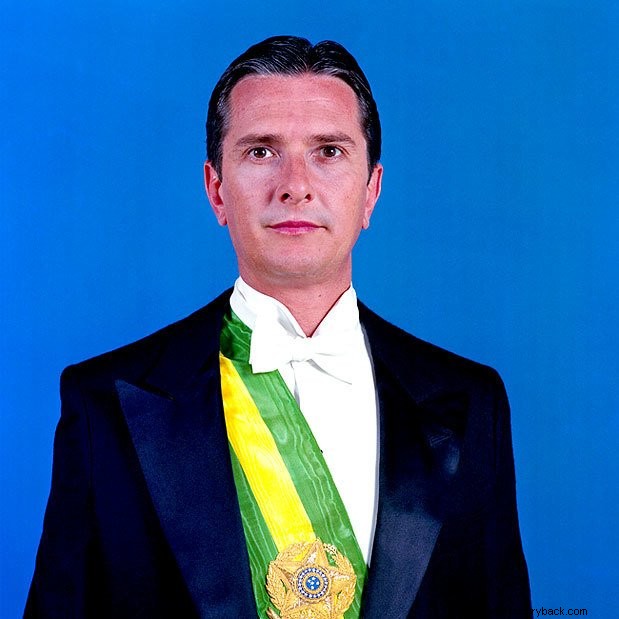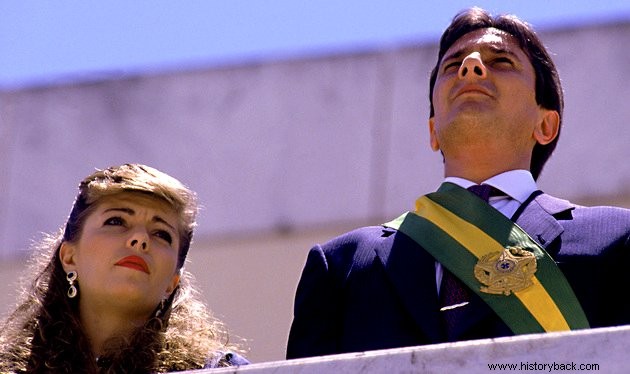Fernando Collor , or simply Collor , is a Brazilian journalist and politician who served as the 32nd President of the Republic of Brazil from 1990 to 1992.
In 2007 he was elected to the Senator of the state of Alagoas and in 2014 he was re-elected to the same position.
Collor's Biography
Son of politician Arnon Afonso de Farias Melo and Leda Collor, Fernando Affonso Collor de Mello was born in Rio de Janeiro, on August 12, 1949.
He studied in Rio de Janeiro, however, he graduated in Economic Sciences from the Federal University of Alagoas and in Economics from the University of Brasília.
In addition, he worked at Jornal do Brasil in Rio de Janeiro and later was director of Gazeta de Alagoas.

It was in Alagoas that he built his political career. First, as appointed mayor of Maceió (1979-1982), then federal deputy (1982-1987) and, finally, governor of Alagoas (1987-1989).
He did not complete his term as governor to run for the presidency of the Republic and would become the first resident elected by right vote after the dictatorship.
He married three times:in 1975, to Celi Elizabeth Júlia Monteiro de Carvalho, with whom he had two children. In 1984, with Rosane Brandão Malta, who would become First Lady of Brazil. Finally, in 2006, with Caroline Medeiros, with whom he had two daughters.
In total, he had 5 children, one of whom was born with his ex-lover Jucineide Brás da Silva in 1980.
Since 2007 he has been a Senator for the State of Alagoas.
Collor Government

After 21 years (1964-1985) of Military Dictatorship in Brazil, without direct elections in the country, in 1989, Brazilians were able to vote for president.
During the electoral campaign, Collor proposed the fight against inflation and corruption, especially against the "marajás", public servants who received high salaries.
Hence, he became known as the “hunter of Maharajas” . He was a great critic of the lower classes and of the catchphrases “ Don't speak in crisis. work ”.
In a fierce dispute, Fernando Collor, from the PRN (National Reconstruction Party) won 35 million votes. Thus, he defeated his opponent, Luiz Inácio Lula da Silva, of the Workers' Party (PT), which obtained 31 million votes. His inauguration was held on March 15, 1990.
Collor Plan
Immediately after taking office, Collor put into practice the “National Reconstruction Plan” (divided into Collor I and II plans). The plan consisted of confiscating savings in order to contain inflation in the country and strengthen the new currency, the cruzeiro novo.
This measure generated enormous discontent among the population. Overnight, both individuals and corporations had only a small amount of cash available in their bank accounts. The government only allowed the withdrawal of only 50 thousand cruzeiros (about R$ 6 thousand).
This economic measure, known as the Collor Plan, resulted in the biggest economic recession in Brazilian history. Inflation skyrocketed, many companies went bankrupt and unemployment soared.
In addition to the confiscation of savings, the Collor Plan was mainly focused on the opening of the Brazilian market, the privatization of public companies and the reduction of civil servants, influenced by the principles of neoliberalism.
Corruption
Shortly after ascending to power, the corruption scheme involving the treasurer of his campaign, Paulo César Farias, better known as PC Farias, is revealed.
In 1992, his brother Pedro Collor de Mello (1952-1994) revealed how public money was embezzled, involving Fernando Collor and PC Farias.
Impeachment

In the face of the scandals, a Parliamentary Commission of Inquiry (CPI) was opened in charge of investigating the actions of President Collor, on June 25, 1992.
The CPI revealed the involvement of Collor and his family in the so-called “PC Faria Scheme”, where a large amount of public money was diverted involving various forms of corruption.
A curious fact reveals its low popularity. Shortly before being deposed, Collor makes a speech on June 20, 1992, in which he asks the population to display cloths with the colors of the Brazilian flag in the windows of their homes, in order to show their support.
The reaction of the population would reveal their critical situation. The next day, people hung black cloths from the windows and went out into the streets dressed in black, as a form of repudiation and a show of mourning.
Through the cries “Out Collor ”, thousands of people took to the streets and painted their faces with green and yellow, demanding the impeachment of the president. This movement became known as Painted Faces.
Judgment
Faced with the movement in the streets and the president's growing political isolation, the Chamber approves the opening of Collor's impeachment process with a count of 441 votes against 38.
The vote goes to the Senate. However, fearful of losing his political rights, Collor resigned from the presidency on December 29, 1992, shortly before he was convicted by the Senate for a crime of responsibility. Even so, he was stripped of his political rights, making him ineligible for eight years.
Later, in 1995, Collor was found not guilty by the Superior Federal Court (STF). He got rid of the accusations of passive corruption with the “PC Scheme”, ideological falsehood and the crime of embezzlement (use of public office to embezzle funds).
After the Impeachment, Collor and the first lady Rosane, move to Miami, in the United States. The presidency would be assumed by its vice-president Itamar Franco, on October 2, 1992.
Finally, Collor's government was very troubled, marked by several corruption scandals, which culminated in his ouster.
However, at least in the state of Alagoas, his prestige remains high, and Collor has twice been a senator in that state.
Curiosities
- In 2016, former president Dilma Rousseff was also removed from the presidency accused of administrative improbity and Collor de Mello participated in the vote as senator.
- PC Farias would be found dead in Alagoas with his girlfriend on June 23, 1996 and to this day the circumstances of the crime have not been clarified.
- Former First Lady Rosane Collor de Mello returned to the media to recount her life with the former president and demand a pension increase.
Read more :
- Impeachment
- Impeachment of Dilma Rousseff
- Neoliberalism in Brazil
